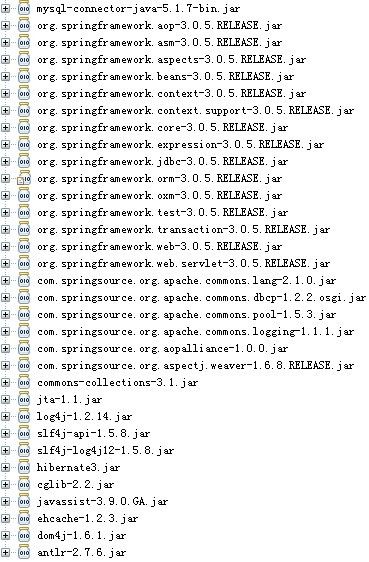Spring3 MVC + jQuery easyUI 做的ajax版本用户管理
上周写了篇基于spring3.0.5 mvc 简单用户管理实例 ( http://www.iteye.com/topic/1072244 ) ,反应还不错,本周闲来无事(外面又在下 雨 淹了不少地方啊)就试了一下Spring3 MVC + jQuery easyUI 做的ajax版本用户管理,因为之前做过一个项目是struts2 + jQuery easyUI 做的。对比了一下,发现 Spring3 MVC确实是比struts2方便啊,特别是对ajax的支持上,转换JSON内置了jackson,太方便了。还是先把jar包帖出来吧
还是要先配置web.xml文件,如下:
<listener>
<listener-class>org.springframework.web.context.ContextLoaderListener</listener-class>
</listener>
<filter>
<filter-name>Set Character Encoding</filter-name>
<filter-class>org.springframework.web.filter.CharacterEncodingFilter</filter-class>
<init-param>
<param-name>encoding</param-name>
<param-value>UTF-8</param-value>
</init-param>
<init-param>
<param-name>forceEncoding</param-name>
<param-value>true</param-value><!-- 强制进行转码 -->
</init-param>
</filter>
<filter-mapping>
<filter-name>Set Character Encoding</filter-name>
<url-pattern>/*</url-pattern>
</filter-mapping>
<!-- 默认所对应的配置文件是WEB-INF下的{servlet-name}-servlet.xml,这里便是:spring3-servlet.xml -->
<servlet>
<servlet-name>spring3</servlet-name>
<servlet-class>org.springframework.web.servlet.DispatcherServlet</servlet-class>
<load-on-startup>1</load-on-startup>
</servlet>
<servlet-mapping>
<servlet-name>spring3</servlet-name>
<!-- 这里可以用 / 但不能用 /* ,拦截了所有请求会导致静态资源无法访问,所以要在spring3-servlet.xml中配置mvc:resources -->
<url-pattern>/</url-pattern>
</servlet-mapping>
然后在applicationContext.xml中简单配置一下数据源和sessionFactory还有声明一下事务处理,这个和之前那一版是一样的,如下:
<?xml version="1.0" encoding="UTF-8"?>
<beans xmlns="http://www.springframework.org/schema/beans"
xmlns:xsi="http://www.w3.org/2001/XMLSchema-instance"
xmlns:aop="http://www.springframework.org/schema/aop"
xmlns:tx="http://www.springframework.org/schema/tx"
xmlns:context="http://www.springframework.org/schema/context"
xsi:schemaLocation="
http://www.springframework.org/schema/beans
http://www.springframework.org/schema/beans/spring-beans-3.0.xsd
http://www.springframework.org/schema/tx
http://www.springframework.org/schema/tx/spring-tx-3.0.xsd
http://www.springframework.org/schema/context
http://www.springframework.org/schema/context/spring-context-3.0.xsd
http://www.springframework.org/schema/aop
http://www.springframework.org/schema/aop/spring-aop-3.0.xsd" default-autowire="byName">
<!-- 注意上面的default-autowire="byName",如果没有这个声明那么HibernateDaoSupport中的sessionFactory不会被注入 -->
<!-- 约定优于配置,约定优于配置 -->
<bean id="dataSource" class="org.apache.commons.dbcp.BasicDataSource">
<property name="driverClassName" value="com.mysql.jdbc.Driver"></property>
<property name="url" value="jdbc:mysql://127.0.0.1:3306/test"></property>
<property name="username" value="root"></property>
<property name="password" value="root"></property>
</bean>
<bean id="sessionFactory" class="org.springframework.orm.hibernate3.LocalSessionFactoryBean">
<property name="dataSource" ref="dataSource"/>
<property name="mappingDirectoryLocations">
<list><!-- 这里直接映射的pojo类所在的包,简单方便不用没次加一个pojo类都需要到这里来添加 -->
<value>classpath:com/fsj/spring/model</value>
</list>
</property>
<property name="hibernateProperties">
<props>
<prop key="hibernate.dialect">
org.hibernate.dialect.MySQLDialect
</prop>
<prop key="hibernate.show_sql">
true
</prop>
</props>
</property>
</bean>
<!-- 自动扫描组件,这里要把web下面的 controller去除,他们是在spring3-servlet.xml中配置的,如果不去除会影响事务管理的。-->
<context:component-scan base-package="com.fsj.spring">
<context:exclude-filter type="regex" expression="com.fsj.spring.web.*"/>
</context:component-scan>
<!-- 下面是配置声明式事务管理的,个人感觉比用注解管理事务要简单方便 -->
<bean id="txManager" class="org.springframework.orm.hibernate3.HibernateTransactionManager">
<property name="sessionFactory" ref="sessionFactory"></property>
</bean>
<aop:config>
<aop:advisor pointcut="execution(* com.fsj.spring.service.*Service.*(..))" advice-ref="txAdvice"/>
</aop:config>
<tx:advice id="txAdvice" transaction-manager="txManager">
<tx:attributes>
<tx:method name="get*" read-only="true"/>
<tx:method name="query*" read-only="true"/>
<tx:method name="find*" read-only="true"/>
<tx:method name="load*" read-only="true"/>
<tx:method name="*" rollback-for="Exception"/>
</tx:attributes>
</tx:advice>
</beans>
最后需要配置的就是spring mvc的配置文件spring3-servlet.xml了,这个和非ajax的版本稍微有点不一样,加入了对json数据转换的配置,因为我用的数据传输都是json类型的数据,如下:
<?xml version="1.0" encoding="UTF-8"?>
<beans xmlns="http://www.springframework.org/schema/beans"
xmlns:xsi="http://www.w3.org/2001/XMLSchema-instance" xmlns:p="http://www.springframework.org/schema/p"
xmlns:context="http://www.springframework.org/schema/context"
xmlns:mvc="http://www.springframework.org/schema/mvc"
xsi:schemaLocation="
http://www.springframework.org/schema/beans
http://www.springframework.org/schema/beans/spring-beans-3.0.xsd
http://www.springframework.org/schema/context
http://www.springframework.org/schema/context/spring-context-3.0.xsd
http://www.springframework.org/schema/mvc
http://www.springframework.org/schema/mvc/spring-mvc-3.0.xsd" default-autowire="byName">
<!-- default-autowire="byName",约定优于配置,约定优于配置 -->
<!-- 配置静态资源,直接映射到对应的文件夹,不被DispatcherServlet处理,3.04新增功能,需要重新设置spring-mvc-3.0.xsd -->
<mvc:resources mapping="/img/**" location="/img/"/>
<mvc:resources mapping="/js/**" location="/js/"/>
<mvc:resources mapping="/css/**" location="/css/"/>
<mvc:resources mapping="/html/**" location="/html/"/>
<!--
①:对web包中的所有类进行扫描,以完成Bean创建和自动依赖注入的功能
-->
<context:component-scan base-package="com.fsj.spring.web" />
<!--
②:启动Spring MVC的注解功能,完成请求和注解POJO的映射,添加拦截器,类级别的处理器映射
-->
<bean class="org.springframework.web.servlet.mvc.annotation.DefaultAnnotationHandlerMapping">
<property name="interceptors">
<list>
<bean class="com.fsj.spring.util.MyHandlerInterceptor"/>
</list>
</property>
</bean>
<!--
②:启动Spring MVC的注解功能,完成请求和注解POJO的映射,
配置一个基于注解的定制的WebBindingInitializer,解决日期转换问题,方法级别的处理器映射
-->
<bean class="org.springframework.web.servlet.mvc.annotation.AnnotationMethodHandlerAdapter">
<property name="cacheSeconds" value="0" />
<property name="webBindingInitializer">
<bean class="com.fsj.spring.util.MyWebBinding" />
</property>
<!-- 配置一下对json数据的转换 -->
<property name="messageConverters">
<list>
<bean class="org.springframework.http.converter.json.MappingJacksonHttpMessageConverter"></bean>
</list>
</property>
</bean>
<!--
③:对模型视图名称的解析,即在模型视图名称添加前后缀
InternalResourceViewResolver默认的就是JstlView所以这里就不用配置viewClass了
-->
<bean class="org.springframework.web.servlet.view.InternalResourceViewResolver">
<property name="prefix" value="/WEB-INF/view/"></property>
<property name="suffix" value=".jsp"></property>
</bean>
</beans>
主页面用了easyui-layout,简单分为了上、左、中三部分,左边的菜单用的easyui-accordion,中间的主页面没有用iframe,就是一个普通的div就可以完成之前要用的iframe的功能哦,还是帖出来吧:
<%@ page language="java" import="java.util.*" pageEncoding="UTF-8"%>
<%@ include file="/taglibs.jsp" %>
<!DOCTYPE HTML PUBLIC "-//W3C//DTD HTML 4.01 Transitional//EN">
<html>
<head>
<title>spring3</title>
<meta http-equiv="pragma" content="no-cache">
<meta http-equiv="cache-control" content="no-cache">
<meta http-equiv="expires" content="0">
<meta http-equiv="keywords" content="keyword1,keyword2,keyword3">
<meta http-equiv="description" content="This is my page">
<script type="text/javascript">
jQuery.ajaxSetup({cache:false});//ajax不缓存
jQuery(function($){
});
function setmain(title,href){
$(".combo-panel").parent(".panel").remove(); //清楚所有class为combo-panel的class为panel的父元素,解决combobox在页面缓存的问题
var centerURL = href;
var centerTitle = title;
$('body').layout('panel','center').panel({
title:"所在位置:"+centerTitle,
href:centerURL
});
$('body').layout('panel','center').panel('refresh');
return false;
}
//弹出窗口
function showWindow(options){
jQuery("#MyPopWindow").window(options);
}
//关闭弹出窗口
function closeWindow(){
$("#MyPopWindow").window('close');
}
</script>
</head>
<!-- easyui-layout 可分上下左右中五部分,中间的是必须的,支持href,这样就可以不用iframe了 -->
<body class="easyui-layout" id="mainBody">
<!-- 上 -->
<div region="north" split="false" style="height:100px;text-align: center;" border="false">
<h1>欢迎: ${userSessionInfo.name}</h1>
</div>
<!-- 左-->
<div region="west" class="menudiv" split="true" title="系统菜单" style="width:200px;overflow:hidden;">
<div id="menuDiv" class="easyui-accordion" fit="false" border="false" animate="false">
<div title="用户管理" style="overflow:hidden;">
<ul>
<li id="rightLi${child.id}" style="cursor: pointer;"
onclick="setmain('用户管理','${ctx}/user/list')" >用户管理</li>
</ul>
<ul>
<li id="rightLi${child.id}" style="cursor: pointer;"
onclick="setmain('用户管理','${ctx}/user/list')" >用户管理</li>
</ul>
<ul>
<li id="rightLi${child.id}" style="cursor: pointer;"
onclick="setmain('用户管理','${ctx}/user/list')" >用户管理</li>
</ul>
</div>
<div title="部门管理" style="overflow:hidden;">
<ul>
<li id="rightLi${child.id}">部门管理</li>
<li id="rightLi${child.id}">部门管理</li>
</ul>
</div>
<div title="XXX管理" style="overflow:hidden;">
<ul>
<li id="rightLi${child.id}">XXX管理</li>
<li id="rightLi${child.id}">XXX管理</li>
</ul>
</div>
<div title="XXX管理" style="overflow:hidden;">
<ul>
<li id="rightLi${child.id}">XXX管理</li>
<li id="rightLi${child.id}">XXX管理</li>
<li id="rightLi${child.id}">XXX管理</li>
</ul>
</div>
</div>
</div>
<!-- 中 -->
<div region="center" class="maindiv" title="所在位置: 首页" style="overflow-x:hidden;padding: 0px;" href="${ctx}/html/welcome.html"
></div>
<div id="MyPopWindow" modal="true" shadow="false" minimizable="false" cache="false" maximizable="false" collapsible="false" resizable="false" style="margin: 0px;padding: 0px;overflow: auto;"></div>
</body>
</html>
这样点击用户管理就可以在center层中打开用户列表了,个人感觉效果还不错,比jQuery UI要漂亮一些,用着也很方便。
中间主页面的代码也很简单,用到了jQeury easyUI的datagrid、combogrid等,用法很简单,关键就是json数据,另外还用到了最好用的日期控件My97DatePicker:
<%@ page language="java" contentType="text/html; charset=UTF-8" pageEncoding="UTF-8"%>
<html>
<head>
<script type="text/javascript">
jQuery(function($){
$('#userTable').datagrid({
title:'用户列表', //标题
method:'post',
iconCls:'icon-edit', //图标
singleSelect:false, //多选
height:360, //高度
fitColumns: true, //自动调整各列,用了这个属性,下面各列的宽度值就只是一个比例。
striped: true, //奇偶行颜色不同
collapsible:true,//可折叠
url:"user/queryList", //数据来源
sortName: 'user.id', //排序的列
sortOrder: 'desc', //倒序
remoteSort: true, //服务器端排序
idField:'uid', //主键字段
queryParams:{}, //查询条件
pagination:true, //显示分页
rownumbers:true, //显示行号
columns:[[
{field:'ck',checkbox:true,width:2}, //显示复选框
{field:'user.name',title:'名字',width:20,sortable:true,
formatter:function(value,row,index){return row.user.name;} //需要formatter一下才能显示正确的数据
},
{field:'user.age',title:'年龄',width:20,sortable:true,
formatter:function(value,row,index){return row.user.age;}
},
{field:'user.birthday',title:'生日',width:30,sortable:true,
formatter:function(value,row,index){return row.user.birthday;}
},
{field:'user.deptId',title:'部门',width:30,sortable:true,
formatter:function(value,row,index){
return row.deptName; //该列的值是deptId,显示的是deptName
}
}
]],
toolbar:[{
text:'新增',
iconCls:'icon-add',
handler:function(){
addrow();
}
},'-',{
text:'更新',
iconCls:'icon-edit',
handler:function(){
updaterow();
}
},'-',{
text:'删除',
iconCls:'icon-remove',
handler:function(){
deleterow();
}
},'-'],
onLoadSuccess:function(){
$('#userTable').datagrid('clearSelections'); //一定要加上这一句,要不然datagrid会记住之前的选择状态,删除时会出问题
}
});
//下拉表格初始化,这个东西在ajax下要尽量少用,太变态了,每加载一次就会重新创建一次,隐藏在页面上,
//时间一长效率很低,用firebug一看页面上有几十个同样的层保存着下拉框中的内容,只有整个页面全部刷新才清除。
//不知道新版本修正了没有,我目前的做法是点击菜单的时候手动清除一下。
$('#deptCombo').combogrid({
idField:'id', //ID字段
textField:'name', //显示的字段
url:"dept/queryAll",
fitColumns: true,
striped: true,
editable:false,//不可编辑,只能选择
columns:[[
{field:'code',title:'编号',width:100},
{field:'name',title:'名称',width:150}
]]
});
});
//新增
function addrow(){
showWindow({
title:'增加用户信息',
href:'user/popWindow',
width:300,
height:250,
onLoad: function(){
$('#userForm').form('clear');
}
});
}
//更新
function updaterow(){
var rows = $('#userTable').datagrid('getSelections');
//这里有一个jquery easyui datagrid的一个小bug,必须把主键单独列出来,要不然不能多选
if(rows.length==0){
$.messager.alert('提示',"请选择你要更新的用户",'info');
return;
}
if(rows.length > 1){
$.messager.alert('提示',"只能选择一位用户进行更新",'info');
return;
}
showWindow({
title:'更新用户信息',
href:'user/popWindow',
width:300,
height:250,
onLoad: function(){
//自动将数据填充到表单中,无需再查询数据库
,这里需要注意:
//如果用的是struts2,它的表单元素的名称都是user.id这样的,那load的时候不能加.user要.form('load', rows[0]);
//而spring mvc中表单元素的名称不带对象前缀,直拉就是id,所以这里load的时候是:.form('load', rows[0].user)
$("#userForm").form('load', rows[0].user);
}
});
}
//删除
function deleterow(){
$.messager.confirm('提示','确定要删除吗?',function(result){
if (result){
var rows = $('#userTable').datagrid('getSelections');
var ps = "";
$.each(rows,function(i,n){
if(i==0)
ps += "?uid="+n.uid;
else
ps += "&uid="+n.uid;
});
$.post('user/delete'+ps,function(data){
$('#userTable').datagrid('reload');
$.messager.alert('提示',data.mes,'info');
});
}
});
}
//表格查询
function searchUser(){
var params = $('#userTable').datagrid('options').queryParams; //先取得 datagrid 的查询参数
var fields =$('#queryForm').serializeArray(); //自动序列化表单元素为JSON对象
$.each( fields, function(i, field){
params[field.name] = field.value; //设置查询参数
});
$('#userTable').datagrid('reload'); //设置好查询参数 reload 一下就可以了
}
//清空查询条件
function clearForm(){
$('#queryForm').form('clear');
searchUser();
}
</script>
</head>
<body>
<form id="queryForm" style="margin:10;text-align: center;">
<table width="100%">
<tr>
<td>名字:<input name="name" style="width: 200"></td>
<td>年龄:<input class="easyui-numberspinner" name="age" min="1" max="120" increment="1" style="width:200px;"></input></td>
<td align="center"><a href="#" onclick="clearForm();" class="easyui-linkbutton" iconCls="icon-search">清空</a></td>
</tr>
<tr>
<td>生日:<input name="birthday" style="width: 200" class="Wdate" onClick="WdatePicker()"></td>
<td>部门:<input id="deptCombo" name="deptId" style="width: 200"></td>
<td align="center"><a href="#" onclick="searchUser();" class="easyui-linkbutton" iconCls="icon-search">查询</a></td>
</tr>
</table>
</form>
<div style="padding:10" id="tabdiv">
<table id="userTable"></table>
</div>
</body>
</html>
这里不得不说,用spring3 MVC对json的转换直接太方便了,只需要在上面说的spring3-servlet.xml中配置一下就可以,后台只需要@ResponseBody一个注解就OK,可以返回map、list等多种数据类型,spring会自动转换为json对象的,比struts2要方便多了,用struts2要<package name="def" extends="json-default" >,还要用json类型的result:<result name="success" type="json"><param name="root">jsonData</param></result>,还要自己组织jsonData,Controller类如下:
@Controller
@RequestMapping("/user")
public class UserController {
@RequestMapping(value="/list",method=RequestMethod.GET)
public String list(Model model) throws Exception {
model.addAttribute("deptList", deptService.getDeptList());
return "user/list";
}
@RequestMapping(value="/queryList",method=RequestMethod.POST)
@ResponseBody
public Map<String, Object> queryList(DataGridModel dgm,TUser user) throws Exception{
//spring太给力了,可以自动装配两个对象 会自动的装返回的Map转换成JSON对象
//return userService.getPageListByExemple(dgm, user);
return userService.getPageList(dgm, user);
}
@RequestMapping(value="/popWindow",method=RequestMethod.GET)
public String popWindow() throws Exception{
return "user/popWindow";
}
@RequestMapping(value="/addOrUpdate",method=RequestMethod.POST)
@ResponseBody
public Map<String, String> addOrUpdate(TUser user) throws Exception{
//spring会利用jackson自动将返回值封装成JSON对象,比struts2方便了很多
Map<String, String> map = new HashMap<String, String>();
try {
userService.addOrUpdate(user);
map.put("mes", "操作成功");
} catch (Exception e) {
e.printStackTrace();
map.put("mes", "操作失败");
throw e;
}
return map;
}
@RequestMapping(value="/delete",method=RequestMethod.POST)
@ResponseBody
public Map<String, String> delete(@RequestParam("uid") List<Integer> uid
)throws Exception{
//spring mvc 还可以将参数绑定为list类型
Map<String, String> map = new HashMap<String, String>();
try {
userService.deleteUsers(uid);
map.put("mes", "删除成功");
} catch (Exception e) {
e.printStackTrace();
map.put("mes", "删除失败");
throw e;
}
return map;//重定向
}
private IDeptService deptService;
public IDeptService getDeptService() {
return deptService;
}
public void setDeptService(IDeptService deptService) {
this.deptService = deptService;
}
private IUserService userService;
public IUserService getUserService() {
return userService;
}
public void setUserService(IUserService userService) {
this.userService = userService;
}
}
怎么样是不是很方便,下面提供了实例项目的下载,实例中没有jar包,jar请依据图中自己添加。

